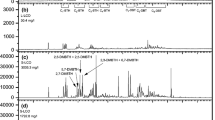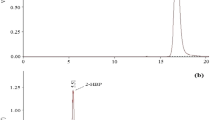Abstract
Some of the noxious atmospheric pollutants such as nitrogen and sulfur dioxides come from the fossil fuel combustion. Biodesulfurization and biodenitrogenation are processes which remove those pollutants through the action of microorganisms. The ability of sulfur and nitrogen removal by the strain Rhodococcus erythropolis ATCC 4277 was tested in a biphasic system containing different heavy gas oil concentrations in a batch reactor. Heavy gas oil is an important fraction of petroleum, because after passing through, the vacuum distillation is incorporated into diesel oil. This strain was able to remove about 40 % of the nitrogen and sulfur present in the gas heavy oil. Additionally, no growth inhibition occurred even when in the presence of pure heavy gas oil. Results present in this work are considered relevant for the development of biocatalytic processes for nitrogen and sulfur removal toward building feasible industrial applications.




Similar content being viewed by others
References
Oyama ST, Zhao H, Gott T, Zhao H, Lee Y (2008) Transition metal phosphide hydroprocessing catalysts: a review. Catal Today 143:94–107
Dinamarca MA, Rojas A, Baeza P, Espinoza G, Ibacache-Quiroga C, Ojeda J (2014) Optimizing the biodesulfurization of gas oil by adding surfactants to immobilized cell systems. Fuel 116:237–241
Onaka T, Konishi J, Ishii Y, Maruhashi K (2001) Desulfurization characteristics of termophilic Paenibacillus sp. strain A11-2 against asymmetrically alkylated dibenzothiophenes. J Biosci Bioeng 92:193–196
Alves L, Mesquita E, Gírio FM (1999) Dessulfurização bacteriana de combustíveis fósseis. Bol Biotech 62:3–8
Stanislaus A, Marafi A, Rana MS (2010) Recent advances in the science and technology of ultra low sulfur diesel (ULSD) production. Catal Today 153:1–68
Song C (2003) An overview of new approaches to deep desulfurization for ultra-clean gasoline, diesel fuel and jet fuel. Catal Today 88:211–263
Gupta N, Roychoudhury PK, Deb JK (2004) Biotechnology of desulfurization of diesel: prospects and challenges. Appl Environ Microb 66:356–366
Le Borgne S, Quintero R (2003) Biotechnological processes for the refining of petroleum. Fuel Process Technol 81:155–169
Afferden MV, Schacht S, Klein J, Trüper HG (1990) Degradation of dibenzothiophene by Brevibacterium sp. Arch Microbiol 153(4):324–328
Maghsoudi S, Kheirolomoom A, Vossoughi S, Tanaka E, Katoh S (1999) Selective desulfurization of dibenzothiophene by newly isolated Corynebacterium sp. strain P32C1. Biochem Eng J 5:11–16
Maghsoudi S, Vossoughi S, Kheirolomoom A, Tanaka E, Katoh S (2001) Biodesulfurization of hydrocarbons and diesel fuels by Rhodococcus sp. strain P32C1. Biochem Eng J 8:151–156
Izumi Y, Ohshiru T (2001) Purification and characterization of enzymes involved in desulfurization of dibenzotiophene in fossil fuels. J Mol Catal A Chem 11(1–4):1061–1064
Keulen FV, Correia CN, Da Fonseca MM (1997) Solvent selection for the biotransformation of terpenes by Pseudomonas putida. J Mol Catal A Chem 5(1–4):295–299
Chang JH, Chang YK, Ryu HW, Chang HN (2000) Desulfurization of light gas oil in immobilized-cell systems of Gordona sp. CYKS1 and Nocardia sp. CYKS2. FEMS Microbiol Lett 182:309–312
Kirimura K, Furuya T, Nishii Y, Ishii Y, Kino K, Usami S (2001) Biodesulfurization of dibenzothiophene and its derivatives through the selective cleavage of carbon-sulfur bonds by a moderately thermophilic bacterium Bacillus subtilis WU-S2B. J Biosci Bioeng 91(3):262–266
McFarland BL (1999) Biodesulfurization. Curr Opin Biotech 2(3):257–264
Setti L, Lanzarini G, Pifferi PG (1997) Whole cell biocatalysis for an oil desulfurization process. Fuel Process Technol 52:145–153
Kilbane JJ II (2006) Microbial biocatalyst developments to upgrade fossil fuels. Curr Opin Biotech 17:305–314
Gray KA, Rhee S, Chang JH, Chang YK, Chang HN (1996) Biochemical characterization of the biodesulfurization of dibenzothiophene by Rhodococcus sp. strain IGTS8—potential role in fossil fuel desulfurization. Abstr Pap Am Chem S 212:54
Monticello DJ (2000) Biodesulfurization and the upgrading of petroleum distillates. Curr Opin Biotech 11:540–546
Folsom BR, Schieche DR, DiGrazia PM, Werner J, Palmer S (1999) Microbial desulfurization of alkylated dibenzothiophenes from a hydrodesulfurized middle distillate by Rhodococcus erythropolis I-19. Appl Environ Microb 65(11):4967–4972
Guchhait S, Biswas D, Bhattacharya P, Chowdhury R (2005) Bio-desulfurization of model organo-sulfur compounds and hydrotreated diesel—experiments and modeling. Chem Eng J 112:145–151
Maass D, Oliveira D, Souza AAU, Souza SMAGU (2014) Biodesulfurization of a system containing synthetic fuel using Rhodococcus erythropolis ATCC 4277. Appl Biochem Biotechnol 174:2079–2085
Li G, Li S, Qu S, Liu Q, Ma T, Zhu L, Liang F, Liu R (2008) Improved biodesulfurization of hydrodesulfurized diesel oil using Rhodococcus erythropolis and Gordonia sp. Biotechnol Lett 30(10):1759–1764
Naito M, Kawamoto T, Fujino K, Kobayashi M, Marushashi K, Tanaka A (2001) Long-term repeated biodesulfurization by immobilized Rhodococcus erythropolis KA2-5-1 cells. Appl Microbiol Biotechnol 55:374–378
Yu B, Xu P, Zhu S, Cai X, Wang Y, Li L, Li F, Liu X, Ma C (2006) Selective biodegradation of S and N heterocycles by a recombinant Rhodococcus erythropolis strain containing carbazole dioxygenase. Appl Environ Microb 72(3):2235–2238
Zhang Q, Tong MY, Li YS, Gao HJ, Fang XC (2007) Extensive desulfurization of diesel by Rhodococcus erythropolis. Biotechnol Lett 29:123–127
Castorena G, Suarez C, Valdez I, Amador G, Fernandez L (2002) Sulfur-selective desulfurization of dibenzothiophene and diesel oil by newly isolated Rhodococcus sp. strains. FEMS Microbiol Lett 215:157–161
Dinamarca MA, Ibacache-Quiroga C, Baeza P, Galvez S, Villarroel M, Olivero P, Ojeda J (2010) Biodesulfurization of gas oil using inorganic supports biomodified with metabolically active cells immobilized by adsorption. Bioresour Technol 101:2375–2378
Yang J, Hu Y, Zhao D, Wang S, Lau PCK, Marison IW (2007) Two-layer continuous-process design for the biodesulfurization of diesel oils under bacterial growth conditions. Biochem Eng J 37:212–218
Otsuki S, Nonaka T, Takashima N, Qian W, Ishihara A, Imai T, Kabe T (2000) Oxidative desulfurization of light gas oil and vacuum gas oil by oxidation and solvent extraction. Energy Fuel 14:1232–1239
Ma C, Feng J, Zeng Y, Cai X, Sun B, Zhang Z, Blankespoor HD, Xu P (2006) Methods for the preparation of a biodesulfurization biocatalyst using Rhodococcus sp. Chemosphere 65:165–169
Andrews JM (2001) Determination of minimum inhibitory concentrations. J Antimicrob Chemoth 48:5–16
Davoodi-Dehaghani F, Vosoughi M, Ziaee AA (2001) Biodesulfurization of dibenzothiophene by a newly isolated Rhodococcus erythropolis strain. Bioresour Technol 101:1102–1105
Heipieper HJ, Neumann G, Cornelissen S, Meinhardt F (2007) Solvent-tolerant bacteria for biotransformations in two-phase fermentation systems. Appl Environ Microb 71:961–973
Whyte LG, Slagman SJ, Pietrantonio F, Bourbonniere L, Koval SF, Lawrence JR, Inniss WE, Greer CW (1999) Physiological adaptations involved in alkane assimilation at a low temperature by Rhodococcus sp. strain Q15. Appl Environ Microb 65:2961–2968
Carvalho CCCR, Parreño-marchante B, Neumann G, Da Fonseca MMR (2005) Adaptation of Rhodococcus erythropolis DCL14 to growth on n-alkanes, alcohols and terpenes. Appl Environ Microb 67:383–388
Carvalho CCCR, Poretti A, Da Fonseca MMR (2004) Solvent toxicity in organic-aqueous systems analyzed by multivariate analysis. Appl Environ Microb 26:361–375
Carvalho CCCR, Da Fonseca MMR (2005) The remarkable Rhodococcus erythropolis. Appl Environ Microb 67:715–726
Carvalho CCCR, Wick LY, Heipieper HJ (2009) Cell wall adaptations of planktonic and biofilm Rhodococcus erythropolis cells to growth on C5 to C16 n-alkane hydrocarbons. Appl Microbiol Biotechnol 82:311–320
Acknowledgments
The authors thank the Brazilian Petroleum Agency—ANP, through PRH-09/MECPETRO, and CNPq for the financial support and scholarships.
Author information
Authors and Affiliations
Corresponding author
Rights and permissions
About this article
Cite this article
Maass, D., Todescato, D., Moritz, D.E. et al. Desulfurization and denitrogenation of heavy gas oil by Rhodococcus erythropolis ATCC 4277. Bioprocess Biosyst Eng 38, 1447–1453 (2015). https://doi.org/10.1007/s00449-015-1386-7
Received:
Accepted:
Published:
Issue Date:
DOI: https://doi.org/10.1007/s00449-015-1386-7




